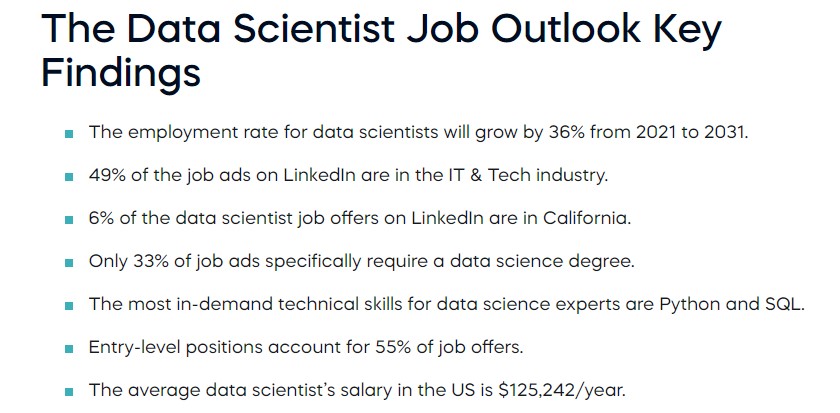Breaking Into a Data Science Career
In the early 1960s, John Turkey described a shift in the statistics profession that referred to the merging of statistics and computers and began to feel as though his main interest was in data analysis. Little did Mr. Turkey or anyone else at the time knew how much interest there would become in data analytics as computers began to insert themselves across industries. About 50 years later, IBM, a global technology innovation company, reported that 90% of the data in the world had been created between 2013-2015.
Today, the Data Science profession has become essential to many businesses, nonprofit/profit organizations, and government agencies as the world economy continues to rely on computers (& now AI technologies).
Data Science professionals are a bit more different than the general statistician, although the basic statistical knowledge is needed for both professions. DS professionals need to have a concrete understanding of software architecture and the multiple programming languages used across the profession; using the principles of Data Science, a data scientist “defines the problem, identifies the key sources of information, and designs the framework for collecting and screening the needed data.”
Read more about the evolution of the Data Science Career here: A Brief History of Data Science.

What Exactly is a Data Science Career?
Data Science careers can have many different trajectories, depending on the skills and knowledge a Data Scientist has. Since DS is an interdisciplinary field, DS professionals can find career opportunities across industries and businesses. Some of those opportunities include…
- Data Analyst: optimizes, visualizes, transforms, and manipulates data
- Data Engineers: develops, tests, and maintains ‘big data ecosystems’
- Database Administrator: maintains a secure and thriving database environment
- Machine Learning Engineer: performs A/B testing, builds data pipelines, and uses Machine Learning techniques to predict trends and/or patterns
- Data Architect: ensures data is accessible and well-organized for those who need to work with it
- Business Analyst: processes and visualizes business insights from data and documents for business growth
Read more about job duties and responsibilities of these career opportunities here: Top 10 Data Science Roles to Look Out for in 2023.
Data Science Skills Are Essential Across Industries
As the economy continues to digitalize, more data will become available, in turn creating more patterns, trends, and problems to understand, visualize, and manage. Larger companies are already using data science professionals to support business growth and success and have paved the way for small and medium sized companies to implement the use of data for the growth of their businesses. Those professionals who have the skills to work directly with data have the empowerment to find opportunities across industry and business sectors.
Basic Data Literacy: Daily tasks and responsibilities of a DS professional, no matter the job title, must require proficiency in basic data literacy skills. Basic data literacy is used “to describe an individual’s ability to read, understand, and utilize data in different ways.” DS professionals should have a basic understanding of the different types of data, common data sources, analysis types, data hygiene, and common tools, techniques, and frameworks. Without basic data literacy skills, major responsibilities become increasingly difficult.
Data Generation & Collection: Depending on the role, data generation and collection might not be a part of the responsibility, but it is one of the earliest (& potentially most important) step in the data life cycle and every DS professional should know and understand the different ways it can be generated and collected. Once data is generated and collected, it can then be distributed out to those who need it. Without knowledge of how it was generated and collected in the first place, it becomes difficult to know where the data should go next.
Data Manipulation: In order for data to be analyzed, it first needs to be transformed into something that can be readily used without errors, gaps, or unrelated information. Data can be manipulated through wrangling, encryption, and compression. Learn more about each manipulation here: Data Science Skills for Beginners. While it might not be a specific job duty for some DS professionals, knowledge of how and why data was manipulated in the way that it was provides a powerful tool for insight.
Analytical, Math, and Programming Skills: Being able to analyze data is what enables a DS professional to find trends, patterns, and insights that inform the business strategy, decisions, and questions. Analytical skills also tie into having proficient skills in math and programming. Those who have knowledge in basic statistics, probability, and algebra will have an easier time thriving in a DS role over those who struggle in math competencies. Those with extensive knowledge and experience working with programming languages like R, Python, and SQL will be better equipped to handle the amount of data there is to analyze.
Data Ethics: Data can include sensitive and personal information that businesses are responsible for keeping organized and protected. Especially those working in medical and customer based industries, there is the risk of losing trust from customers and legal fines/penalties for failing to protect specific data and information. It is important to have knowledge and understanding of the laws and regulations in places that dictate how data can and should be used within certain businesses and industries.

Career Outlook for Data Science Professionals
In June of 2023, 365 Data Science published their research into the career outlook for Data Scientists based on 1,000 LinkedIn job postings. They discovered that the DS career is going nowhere anytime soon and is projected to be one of the most in-demand jobs currently out there.

DWC’s Python Data Science Certification
Our Python Data Science Certificate Program is taught through a comprehensive curriculum focused on Python software, working with big data, and visualizing and modeling the results; students gain real world knowledge and insight from instructors who are experts in the field. By the end of the program, students will have gained skills in Python software, organizing/cleaning data, identifying key data features, applying data analysis for business purposes, creating automative tasks and reports, and so much more.
